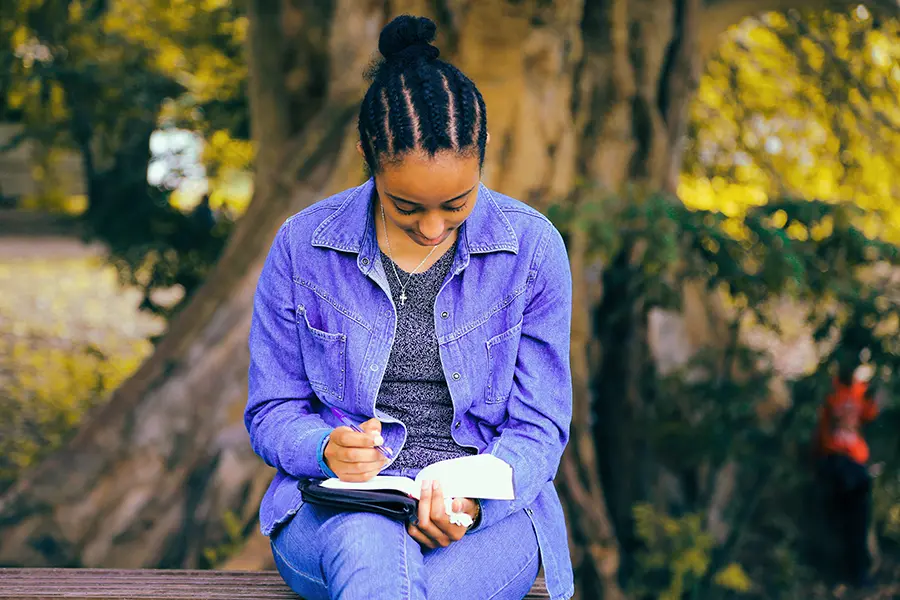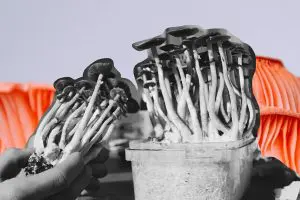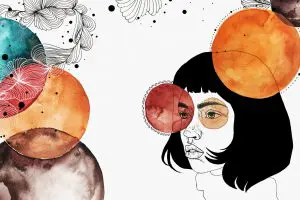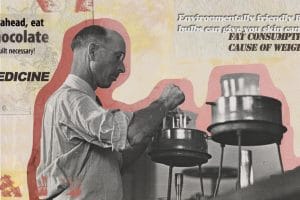“ What does it all mean?/I never ask that, being shy/In this apartment in which I dwell.” – Anne Waldman
Throughout my life, writing has allowed me to process, integrate, examine, and then shape my response both internally and externally. As Bessel A. van der Kolk puts it in the somatic therapy classic The Body Keeps the Score: Brain, Mind, and Body in the Healing of Trauma: “In order to change, people need to become aware of their sensations and the way that their bodies interact with the world around them. Physical self-awareness is the first step in releasing the tyranny of the past.”
The “tyranny of the past” is one way to put it, but for me, this stands for all experiences. Writing, poetry, and psychedelics allow me to comprehend the landscape of my own life as a story, an explosion of “happenings.” I think that poetry and writing, be it journaling, long-form narrative, collaborating with friends via workshops, or even writing letters can prove therapeutic. The world, like psychedelics, asks a lot from us (some more than others) and integration is essential to processing our lives.
Writing, poetry, and psychedelics allow me to comprehend the landscape of my own life as a story, an explosion of “happenings.”
As I write this, the Covid19 pandemic is happening outside my apartment in Brooklyn and across the globe. There’s something about the pandemic itself that has proven to be a bit psychedelic: uncertain, bizarre, and a crushing force of perspective.
On the phone with a friend, he told me to just “ride the wave” of it. So I opened my notebook.
What began as a personal exercise flowed into a collective project called Pandemic Poems: a way to co-create poetry via e-mail with poets, friends, and strangers through my inbox. Once someone subscribes to the project, I reach out. Then we create a poem together going line by line via email. We’re able to co-create between our individual isolated existences.
With The Poetry Society of New York’s help, we hosted a day of collaborative poetry, Pandemic Poems: May Day.
Collectively, two hundred people across the globe were partnered with each other. We gave each set of people a starting and ending line, so that we would be able to tie the poems in together, to create one long “crown” of nontraditional sonnets. I was shocked to see where everyone was coming from, ranging from my very own neighbors to people in Mumbai, New Zealand, Kenya, and the west coast.
I watched a woman who I had worked my first job with at an ice cream shop near the railroad tracks in my small hometown (who now lives in San Francisco) write with someone in Miami who I had taught a poetry workshop with. My mom made another poem with a stranger. I was connected with people I never would have spoken to otherwise. And this was just my experience.
How to Grow Shrooms Bundle
Take Both of Our Courses and Save $90!
While poems about the pandemic may not initially feel psychedelic, I’d like to argue they are. There is nothing more psychedelic to me than the co-creation of art. Where together we stare down the long barrel of the human experience and condition. Where we seek joy and complexion in the face of all that.
What is Psychedelic Poetry?
I remember sitting in The Bowery in 2016 discussing “psychedelic poetry.” I was in a room of the old school psychedelic community of writers and poets, Ken Jordan, Lee Ann Brown, Tony Torn, Bob Holman, and Nessa Norich. We were talking about hosting Psychedelic Poetry Night at The Alchemist’s Kitchen, a then brand new plant-medicine shop. I had just moved to New York City, a new graduate with a degree in poetry (ha-ha). We decided event attendees would come and listen as readers presented their most psychedelic pieces. This began my love of psychedelic poetry—poetry written for integrating psychedelic experiences. And it would continue to be a lifelong journey of working with the craft of writing.
A writer and a poet, I have always been drawn to the psychedelic. To me, psychedelic means a divergence from convention, and a different, many-hued way to view the world.
Psychedelic poetry is poetry crafted from an ecstatic brain space. It can look like a recollection of a psychedelic experience, homage to a trip, a connection to the natural world. Or it could be a way to open consciousness and forge a path to making sense of the world around us.
While poems about the pandemic may not initially feel psychedelic, I’d like to argue they are. There is nothing more psychedelic to me than the co-creation of art.
The psychedelic spaces of the past, and the literature about these medicines, have been largely dominated by men. However, women were there, too, and they were writing, processing, and making sense of their experiences.
A favorite of mine is Anne Waldman, legendary poet and performer. Waldman wrote Jaguar Harmonics and Fast Speaking Woman, which was inspired by the sacred mushroom chants of Mazatec curandera Maria Sabina. In Jaguar Harmonics, Waldman writes that in, “the voice of the Ayahuasca vine, a ‘person woven of sound’ speaks to the poet.” In Fast Speaking Woman she writes, “I’m a playful-light woman/I’m a tidal-pool woman/ I’m a fast speaking woman.”
There is also Lee Ann Brown (who was present at the Psychedelic Poetry Night). In her poem Sustain Petal the speaker chants in a dream-like and surreal way calling to those who remember their dreams. She writes, “ who remembers your dreams/who acts upon them in this world/Come you.”
What is Psychedelic Integration
In brief, psychedelic integration is the period after a psychedelic experience, during which you process the lessons learned during the trip, and incorporate them into your daily life. This process can be somewhere between magical and challenging, depending on the situation, and so having a proper toolbox is vital.
While there’s growing curiosity around entheogens like shrooms or MDMA for therapeutic purposes, there’s also a gap in the medical model, whereby mental health professionals might not have the adequate training to help their patients (such as those in regular, weekly talk therapy) “integrate their often profound, ineffable psychedelic experiences into mundane life.” If you’re looking for support, you can find a list of psychedelic integration therapists here.
DoubleBlind has some suggestions for ways to process your last trip here as well.
How Writing Can Act as a Form of Psychedelic Integration
The Journal of the American Medical Association held a study on the physical effects of writing. They instructed 107 asthma and rheumatoid arthritis patients to write for 20 minutes on each of three consecutive days. 71 of them wrote about stressful events and the rest about the emotionally neutral subject of their daily plans.
According to the American Psychological Association, “Four months after the writing exercise, 70 patients in the stressful-writing group showed improvement. In addition, those who wrote about stress improved more and deteriorated less, than controls for both diseases. ‘So writing helped patients get better, and also kept them from getting worse,’” said researcher Joshua Smyth, PhD, from Syracuse University.
Read: COVID-19 Isn’t Just a Medical Crisis—It’s an Existential One
Journaling can be a helpful exercise both during or immediately after a psychedelic experience. As one contributor to an article on integration shared, “Writing things down, even in sentence fragments or bits of descriptions of visions, has been a really important way for me to remember insights that I got from trips that reverberate with me to this day.”
Psychedelic Support recommends, “build journaling into your daily routine. Julia Cameron’s famous ‘Morning Pages’ method outlined in The Artist’s Way aims to capture the stream of consciousness with three pages daily.” This is a practice that suggests that by writing three stream of consciousness pages a day, your creativity and vantage point on the world can be improved, sharpened, and honed.
How to Write Psychedelic Poetry
The Ecstatic Adventure, from The Psychedelic Library says, “It is not surprising then that many attempts have been made to translate the fantastic experiential explosions induced by psychedelics into poetic metaphor.” So a good place to start is to concern yourself with the flow.
- Flow: Try stream of consciousness writing, even if you’re writing about how you have no idea what to write about.
- Write without judgment: Try not to pass judgment on yourself, recollect and jot down what comes up for you, and allow yourself the space to do so.
- Set a timer for ten minutes: Anyone can do anything for ten minutes (for the most part).
- See what shows up for you: Whether you re-read immediately or put the notebook away, you can see what comes up for you when you allow yourself the space to create.
The Pandemic and The Arts
How can we use these tools to make sense of what’s happening in the world right now? As I mentioned earlier, there’s something a bit psychedelic about these times. We’re all uncertain about what comes next for us, and there’s a sense of isolation and connectedness at the same time.
In the New York Times, Megan O’Grady writes about the art of pandemics past: “None of us really has the luxury of opting out, of just not thinking about it. The 2020 pandemic will change the way we see art forever, too, and artists and writers have already begun doing the work of illuminating new shifts and losses, documenting the small kindnesses and cruelties, the large failures of leadership, technology, and society.”
How to Grow Shrooms Bundle
Take Both of Our Courses and Save $90!
Writing and the Pandemic
A friend sent me this project, The Isolation Journals which updates your inbox, prompting you to do one creative act a day alone, together. “I think a lot of people do morning journaling as a practice at home, which I’ve done for years, but I think it’s helpful in times like this when we’re cooped up and we are more prone to getting into having these repetitive thoughts, especially when there’s so much anxiety in the world,” the project’s founder Suleika Jaouad tells Vogue.
The New York Times features ways to write through the pandemic here.
Psychedelic Poetry for Integration
Lately, I’ve been thinking about my life in the terms of before and after, and I wonder if other people have been doing that too. I will not be unchanged by this experience, and like a psychedelic trip, I imagine that we will all need to do some processing. But this processing brings with it the potential of a new perspective, or a different horizon out ahead of us. I would not use the word optimistic, but like Lee Ann Brown, I am calling upon those who remember their dreams in a hopeful way. I imagine that Pandemic Poems, like my own practice of writing, will grow and change as I do too. I do not know what comes after this after, but I hope that it will be many hued, and at least a little bit psychedelic.

DoubleBlind is a trusted resource for news, evidence-based education, and reporting on psychedelics. We work with leading medical professionals, scientific researchers, journalists, mycologists, indigenous stewards, and cultural pioneers. Read about our editorial policy and fact-checking process here.

DoubleBlind Magazine does not encourage or condone any illegal activities, including but not limited to the use of illegal substances. We do not provide mental health, clinical, or medical services. We are not a substitute for medical, psychological, or psychiatric diagnosis, treatment, or advice. If you are in a crisis or if you or any other person may be in danger or experiencing a mental health emergency, immediately call 911 or your local emergency resources. If you are considering suicide, please call 988 to connect with the National Suicide Prevention Lifeline.



